Learn About The Plastics Treaty ➝
Protect our planet! Last chance to join the call for a strong Plastics Treaty. SIGN THE PETITION NOW.
Manila, Philippines—Over 300 young people from around the world gathered on April 14-15, 2023, for the #BreakFreeFromPlastic Youth Summit 2023 to share their voices and skills for a future free of plastic pollution. The two-day virtual event serves as a capacity-building and alliance-building event to help young people and youth-serving organizations be better equipped to launch campaigns and activities to engage governments and country delegations participating in the international negotiations for the Global Plastics Treaty.
In March 2022, the United Nations approved an agreement to create a global plastics treaty— the world's first legally binding document to end plastic pollution— adopted at the conclusion of the fifth United Nations Environment Assembly (UNEA 5.2). The global plastics treaty will cover measures to address pollution throughout the existence of plastic, from extraction to remediation. Countries are set to start the second of the five-part negotiations (International Negotiating Committee--INC-2) for the drafting of the global plastics treaty in the last week of May 2023. The final draft of the treaty is expected to be done by 2024.
Young peoples' voices are instrumental in effecting significant change and influencing governments to push for high ambitions and measures for the global plastics treaty as negotiations continue over the next year and a half.
The two-day youth summit equipped young people with the necessary knowledge about the Global Plastics Treaty process, its significance, and how they could take part in this critical juncture in the fight to end plastic pollution, through national campaigns and projects. Experts from different countries and fields shared their knowledge and joined discussions on plastic pollution, policy making, youth leadership, national and global campaigns, and other opportunities for concrete actions.
The event also opened doors for youth organizations and alliances to join the #BreakFreeFromPlastic movement and support global plastics treaty demands of civil society groups.
Watch: Youth Summit Day 1 recording
“I strongly believe that a global plastic treaty is essential for communities all over the world. The overwhelming amount of single-use plastic waste that ends up in the Global South, predominantly due to Global North accountability, has far-reaching consequences for our ecosystems, wildlife, and human health,” said Taylen Reddy of Zero Waste Durban. “A global plastic treaty would unite nations in tackling the issue of plastic pollution and put the onus on those who are most responsible for it. Moreover, this treaty would provide a strong framework to combat waste colonialism and ensure a more equitable distribution of responsibility.”
“Youth power is the life of the fight for a legally binding Global Plastics Treaty,” said Jairus Chiu of Kabiling Lunhaw Philippines. “This fight isn’t just for the present youth, but for the future as well. Amplifying youth voices in this agenda is a statement to the leaders and policymakers of the world that this is what we want and what we desperately need. Youth power is simply the most dynamic, explosive, creative, and innovative force there is and the world needs it to achieve our ambitious Global Plastics Treaty.”
“Young peoples’ energy, passion, and imagination is their biggest strength—they can move mountains if they want to,” said Tiara Samson of Break Free From Plastic. “The way they organize quickly, and make noise is unparalleled, and their anger can be channeled towards longer term goals for policy advocacy. The Global Plastics Treaty (GPT) is a historical opportunity to rally towards a just future for themselves, as they have long been demonstrating that they are leaders of today. Convening them to ideate and enabling them to work towards their goals by engaging meaningfully with the GPT process is only.”
Watch: Youth Summit Day 2 recording
About BFFP — #BreakFreeFromPlastic is a global movement envisioning a future free from plastic pollution. Since its launch in 2016, more than 2,700 organizations and 11,000 individual supporters from across the world have joined the movement to demand massive reductions in single-use plastics and push for lasting solutions to the plastic pollution crisis. BFFP member organizations and individuals share the values of environmental protection and social justice and work together through a holistic approach to bring about systemic change. This means tackling plastic pollution across the whole plastics value chain – from extraction to disposal – focusing on prevention rather than cure and providing effective solutions. www.breakfreefromplastic.org.
Hello! Can you tell us a bit about yourself and your organisation?
My name is Davit Sidamonidze, and since 2011 I have represented the Greens Movement of Georgia/Friends of the Earth-Georgia, based in Georgia (Caucasus - not the United States). The Greens Movement of Georgia is an organisation aiming to protect the environment, human and ethno-cultural surroundings according to the principles of sustainable development; to end the technocratic and utilitarian treatment attitude towards nature; to establish ecologically safe technologies; to build solidarity and peace between people, and in particular to build an ecologically and socially sustainable society.
We are a non-profit organisation that deals with a broad range of environmental issues and we implement our mission through campaigns and practical activities, public information and involvement, policy making and lobbying. Established in 1989, the Greens Movement of Georgia is one of the largest and oldest environmental organisations in Georgia with 41 local groups throughout the country and more than 1200 members!
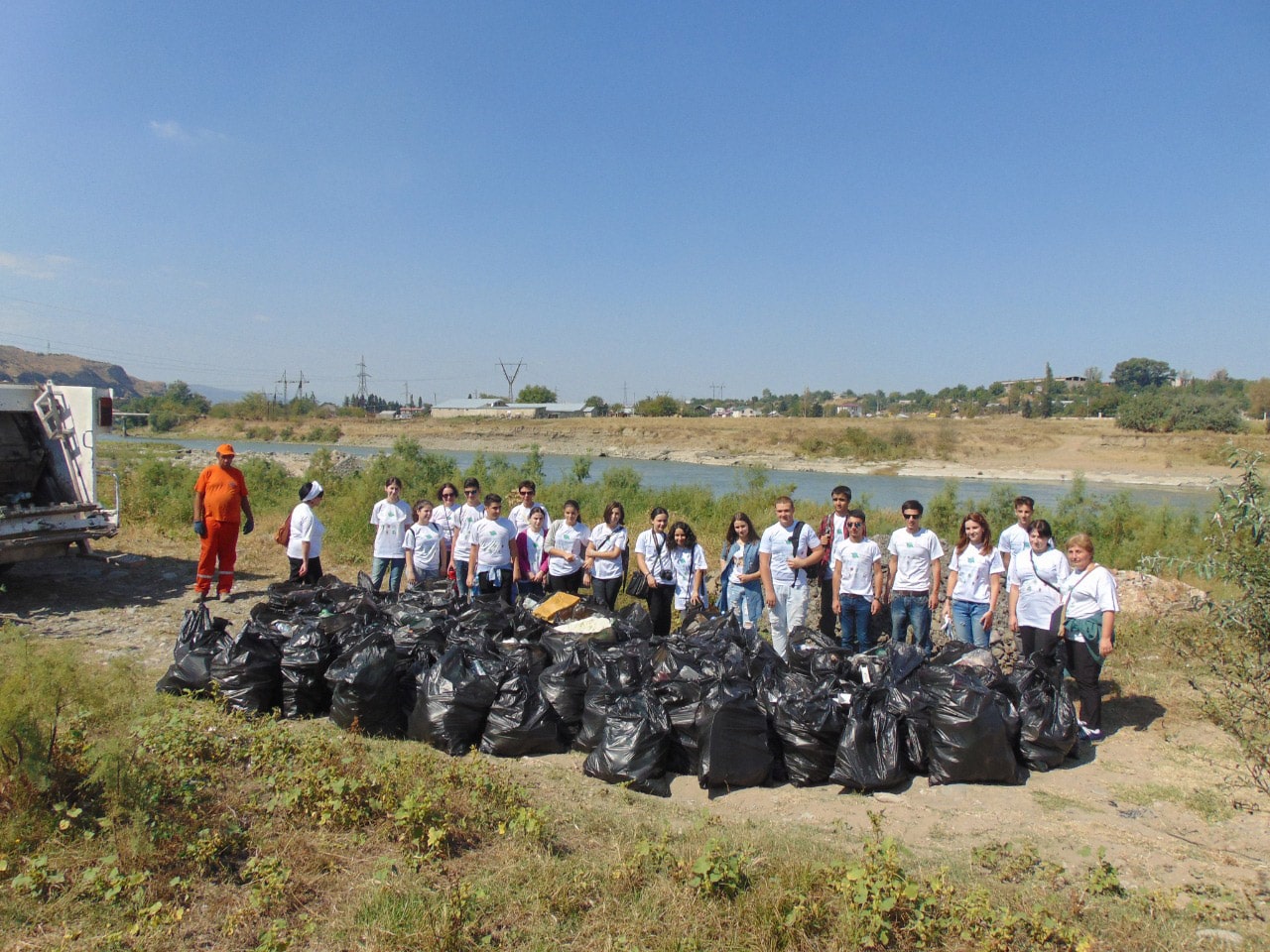
Why are you working on the topic of plastic pollution?
Plastic pollution is really problematic in Georgia, it is a serious challenge. With the absence of effective local legislation, the state has only managed to pass regulations that affect cellophane. Despite numerous initiatives, Georgia still doesn't have infrastructure for separate waste collection. Unfortunately, an extended producers responsibility scheme (EPR) on packaging materials (of which 80% is plastic) has not yet been introduced, so companies do not have to take responsibility for the costs of managing the waste associated with their products or packaging. Because of this, there is plenty of reason to be motivated to fight for better legislation on plastics in Georgia!
Tell us about your ongoing campaigns and what you focus on in your work.
Since 2010, we have carried out several campaigns, such as "Let's clean up Georgia"; "Keep Georgia Tidy"; "Blue Stream"; and "Clean Region". And we have learnt so much through our membership with Break Free From Plastic.
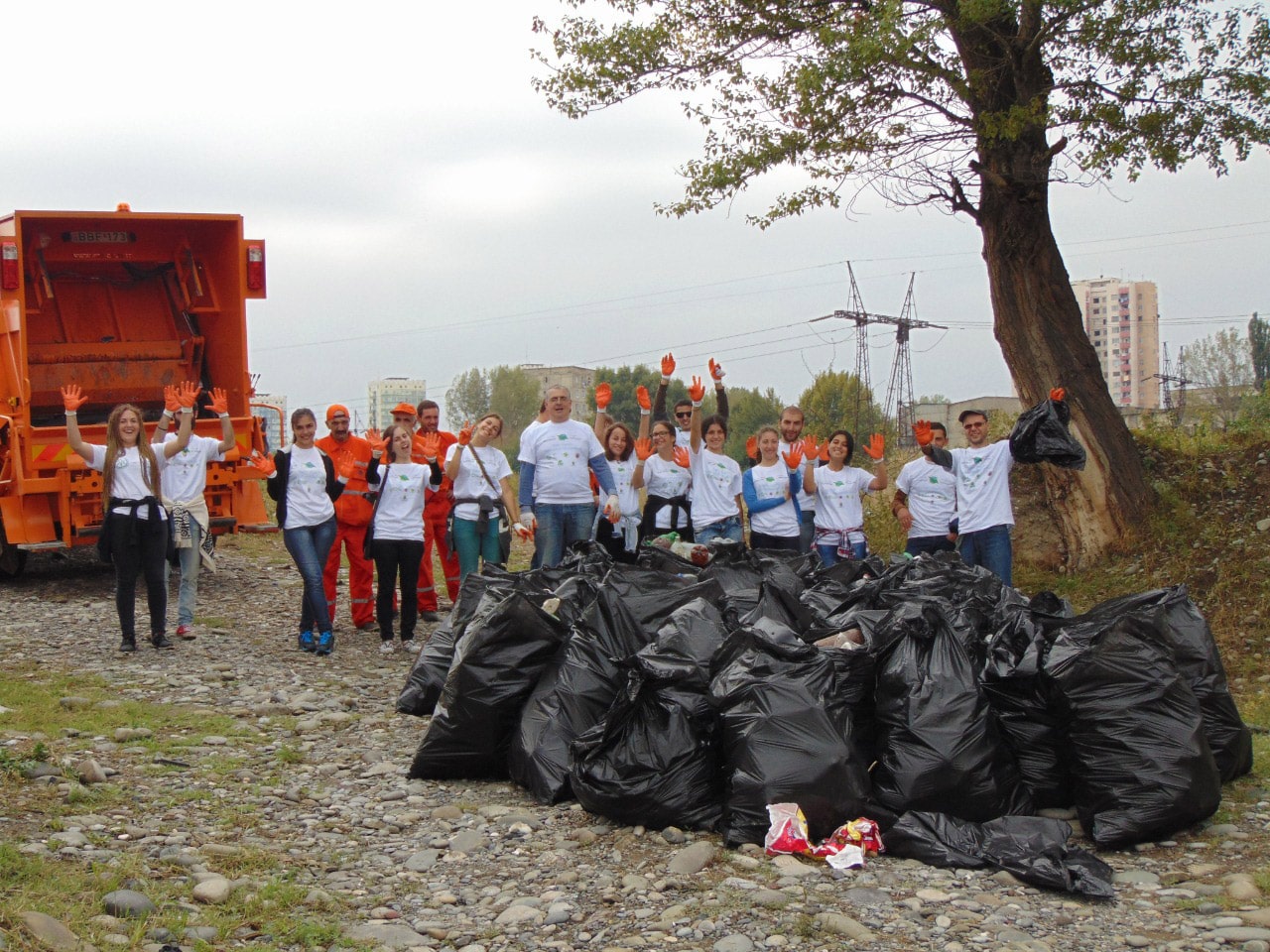
You were part of the delegation at COP27 in Egypt. What were your impressions?
Despite the fact that almost everything in the venue was wrapped or contained in plastic and many big plastic polluters were financing the event such as Coca-Cola, COP27 did end with a significant breakthrough for developing nations. A special Loss and Damage fund in which countries responsible for high carbon emissions compensate countries suffering from climate impacts was established. This was a milestone which we greatly celebrated! Yet it should not detract from the many other climate issues that further entrench losses and damages in developing nations.
The fact that the outcome only talks about the ‘phasedown of unabated coal power’ is a disaster for Africa and for the climate. For a possibility of a just and rapid energy transition, oil and gas must also be phased out, swiftly and fairly. This small word, ‘unabated’, creates a huge loophole, opening the door to new fossil-based hydrogen and carbon capture and storage projects, which will allow emissions to continue to rise. We wish to see more actions and, at the very least, discussions about plastic during future COPs.
The negotiations for a binding Global Plastics Treaty are kicking off. How have you been involved so far? Why should the BFFP/its members put a particular focus on it?
Though we were not yet fully involved in the preparation of the first Global Plastics Treaty negotiations, with support from BFFP members, European Investigation Agency, we did succeed in pushing our government to take an active role in the process. Break Free From Plastic has paid particular attention to it because the nature of the treaty provides a unique opportunity to push for ambitious measures that actually prevent further plastic pollution. And it is with the action of civil society such as Break Free From Plastic, that puts pressure on governments to ensure we can't achieve ambitious goals.
What is the most outlandish statement, argument or activity you have seen or heard of in connection to plastic that you think everybody should know about?
There is a strange saying that has been established in Georgia for years: "you have to put garbage in the river and the water will take it away". This coupled with a strange Georgian tradition established during the Soviet era where all landfills were placed on the banks of the river, has created and still creates a serious problem. We have been fighting these norms very effectively in recent years with our campaigns and will continue to do so!
Where: Meetspace A, Artotel Thamrin, Jakarta (map link here)
When: 03 November, 2022 at 14:00 - 15:00 Indonesia | 15:00 - 16:00 Malaysia & the Philippines
On November 3, 2022, a press briefing was organised by Alianzi Zero Waste Indonesia (AZWI) and Break Free From Plastic (BFFP) to:
To recapitulate, ahead of the Global Plastic Treaty negotiations, organisations fighting plastic pollution, recognise the need to address waste trade issues in Asia Pacific. Plastic waste imports cause serious pollution and threaten the health of local communities across the Asia Pacific. If the world is serious about tackling marine plastic pollution, the open trade of plastic waste from rich and industrialised economies to less industrialised ones must end.
As we build a vision for the Global Plastic Treaty, we need to demand an integrated, holistic systems approach to the entire plastic value chain, from extraction to disposal. The transition to a future free from plastic pollution should allow us to hold accountable those most responsible, while engaging and amplifying the voices of those most impacted.
In addition, you may also quote our panelists, as below:
Quotes:
Yuyun Ismawati, co-founder and Senior Advisor of Nexus3 Foundation, Indonesia
“The improved regulation [on plastic waste trade] has reduced violations that we can observe on the grassroots level, however, government transparency is lacking in the implementation. Past violations, which were administratively sanctioned, left the environment and the surrounding communities burdened with questionable practices of destroying hundreds of containers filled with untreatable imported plastic waste by the violating companies.”
Mochamad Septiono, Program Officer for Toxic and Zero Waste Program at Nexus3 Foundation.
“Moving forward, the Indonesian government should be ambitious in setting the roadmap to massively increase the proportion of domestic recycling to fulfil the national industry demand, especially to boost separated waste collection. The current contamination threshold (2%) should be strictly enforced, and further increased to 0-0.5% contamination (recyclates ready for direct production/recycling process for secondary raw materials). In addition, waste-derived product commodities (RDF/PEF pellets, or in any form) should be prohibited to import.”
Pua Lay Peng, chemical engineer and human rights defender with Kuala Langat Environmental Action Association, Malaysia.
"In recent years, Malaysia has become one of the biggest waste importers. It leaves a trail of pollution, especially from waste plastic since China’s ban on import wastes in 2017. We are suffering the consequences of increasing respiratory system disease and cancer rates. Corruption is one of the reasons why so much waste has been smuggled into Malaysia. This waste has very little benefit. Instead we’re left with refuse material containing harmful chemicals, and many leftover plastics will just be burnt in the incinerator or discarded at landfills. Southeast Asia is not the world’s dumping site. Developed countries should deal with their own plastic waste."
Fajri Fadhillah, lawyer-researcher at Indonesian Center for Environmental Law (ICEL), Indonesia
“Developed countries must stop exporting plastic waste to Asia Pacific countries. Most practices of these exports are illegal or criminal activities. The importing and exporting countries who have ratified the Convention need to put in forth the sanctions to persons or corporations who violate the convention.”
Aileen Lucero, National Coordinator of EcoWaste Coalition, the Philippines.
“ASEAN as a regional bloc should prohibit all importations of plastic waste. To address the plastic pollution crisis, we further request the ASEAN member states to develop strong plastic reduction policies, including phasing-out single use plastics.”
Media Resources:
This report provides a summary of the dynamics of plastic waste trade conditions in Indonesia, covering the policy changes, volume fluctuation, trade routes, role of recycling industry, trade violation, and most importantly, recommendations - curated for the Indonesian government, industry & industry associations, think tanks and NGOs as well as the general public.
Waste Trade briefs by The Center to Combat Corruption and Cronyism (C4 Center), Malaysia
These briefs draw from 40 interviews with government officials, businesses and community representatives, these briefs provide an overview of waste trade in Malaysia.
Waste Trade in the Philippines: How Local and Global Policy Instruments Can Stop the Tide of Foreign Waste Dumping in the Country, Greenpeace Philippines and Ecowaste Coalition
This report investigates the laws, the policies, and the shortfalls that have allowed illegal waste into the Philippines and also "legal" waste for which the country lacks an infrastructure capable of protecting the health of people and the environment.
Sign the #StopShippingPlasticWaste petition
Solidarity Open Letter for the EU Waste Shipment Regulations vote
This is an open call to the European Parliament to ban plastic waste exports outside the European Union in the latest revision of the Waste Shipment Regulations and put in safeguards to ensure waste dumping does not occur within the EU.
If you would like to further interact/interview any of our panelists or need to connect with other subject matter experts in Asia Pacific, please reach out to:
Devayani Khare, Project Communications Officer - Asia-Pacific
Break Free From Plastic
devayani@breakfreefromplastic.org
AZWI is an alliance that currently consists of 10 environmental organizations. AZWI campaigns for the correct implementation of the Zero Waste concept in order to mainstream various existing Zero Waste activities, programs and initiatives to be implemented in various cities and regencies in Indonesia by considering the waste management hierarchy, material life cycle, and circular economy.
#breakfreefromplastic is a global movement envisioning a future free from plastic pollution. Since its launch in 2016, more than 2,500 organizations representing millions of supporters around the world have joined the movement to demand massive reductions in single-use plastics and push for lasting solutions to the plastic pollution crisis. BFFP member organizations and individuals share the shared values of environmental protection and social justice and work together through a holistic approach to bring about systemic change. This means tackling plastic pollution across the whole plastics value chain—from extraction to disposal—focusing on prevention rather than cure and providing effective solutions.
What: The Global Plastics En’Treaty: why waste trade to the Asia-Pacific needs to stop
Where: Meetspace A, Artotel Thamrin, Jakarta (map link here)
When: 03 November, 2022 at 14:00 - 15:00 Indonesia | 15:00 - 16:00 Malaysia & the Philippines
Online: bit.ly/MBonWasteTrade
From 28 November to 2 December 2022, the first session of the intergovernmental negotiating committee (INC) will convene in Uruguay, South America. This session plans to develop an international legally binding instrument on plastic pollution, including in the marine environment - in other words, it will set the tone for the conversation on the Global Plastic Treaty.
Policy debates to solve plastic pollution often focus on downstream solutions like strengthening waste management systems. However, waste trade - the transboundary movement of waste between countries for further treatment, disposal, or recycling - which has increased in tandem with plastic production and plastic pollution, is often left out of the conversation.
Plastic waste imports cause serious pollution and threaten the health of local communities in Indonesia, as well as several other countries in the Asia Pacific. As we build a vision for the Global Plastic Treaty, we need to address the harms caused by plastic waste trade.
As delegates at the upcoming INC meetings, Break Free From Plastic members will demand an integrated, holistic systems approach to the entire plastic value chain, from extraction to disposal. The transition to a future free from plastic pollution should allow us to hold accountable those most responsible, while engaging and amplifying the voices of those most impacted.
Yuyun Ismawati, co-founder and Senior Advisor at Nexus3, Indonesia
With a background in environmental health and waste convention negotiations, Yuyun works on community waste management systems. Yuyun will talk of why the waste colonialism perpetuated by illegal waste trade needs to end, and Indonesia’s government should take cognizance of its impacts on domestic waste management systems and communities. She will also share findings from the Nexus3 report.
Fajri Fadhillah, lawyer-researcher at Indonesian Center for Environmental Law (ICEL), Indonesia
As an environmental lawyer, keen on public participation in waste reduction, Fajri will cover the legal implications of flouting laws, such as the Basel Convention Plastic Waste Amendments. He will also talk about why the plastic waste trade is a false solution, and how exporters can be held accountable for the environmental and health impacts of their actions.
Pua Lay Peng, chemical engineer and human rights defender with Kuala Langat Environmental Action Association, Malaysia
For years, Pua has documented the illegal activity and pollution from imported or trafficked waste in Malaysia. She has actively campaigned against the importation of waste into the country. She will speak about the often hidden side to the global plastic waste trade – the loopholes and illegalities – and the impacts on health and human rights of communities living at the fringes of illegal plastic recycling factories in Malaysia.
Aileen Lucero, National Coordinator of Ecowaste Coalition, the Philippines
The recent ASEAN waste trade report published by Ecowaste Coalition, provides a survey of regional efforts to recognize and address the issues of plastic pollution and waste management. Aileen will talk of the progress on the ratification and acceptance of the Basel Ban Amendment in the ASEAN region, and how ASEAN civil societies and governments need to work together to hold businesses accountable.
About the Nexus3 Waste Trade Report
The latest Nexus3 waste trade report summarizes the dynamics of the plastic waste trade conditions in Indonesia - with updated data from the past three years. It covers the policy changes, volume fluctuations, trade routes, role of the recycling industry, trade violations, and most importantly, offers recommendations for Indonesia. It is curated for the Indonesian government, industry & industry associations, think tanks and NGOs as well as the general public.
This report is especially relevant as the government has lacked transparency in the implementation of waste trade violations in the past, and to equip Indonesia to learn from its mistakes which had serious impacts on the environment and the surrounding communities. The report can also serve as an example for other countries in the region to frame their own waste trade legislation.
Vancher Dipatiukur, Alianzi Zero Waste Indonesia: vancher@aliansizerowaste.id
Devayani Khare, Break Free From Plastic: devayani@breakfreefromplastic.org
AZWI is an alliance that currently consists of 10 environmental organizations. AZWI campaigns for the correct implementation of the Zero Waste concept in order to mainstream various existing Zero Waste activities, programs and initiatives to be implemented in various cities and regencies in Indonesia by considering the waste management hierarchy, material life cycle, and circular economy.
#breakfreefromplastic is a global movement envisioning a future free from plastic pollution. Since its launch in 2016, more than 2,500 organizations representing millions of supporters around the world have joined the movement to demand massive reductions in single-use plastics and push for lasting solutions to the plastic pollution crisis. BFFP member organizations and individuals share the shared values of environmental protection and social justice and work together through a holistic approach to bring about systemic change. This means tackling plastic pollution across the whole plastics value chain—from extraction to disposal—focusing on prevention rather than cure and providing effective solutions.
This year’s “Recycle Week”, which is urging people to “Get Real about Recycling”, has been slammed by environmentalists as “corporate greenwashing” with some of the worst polluters in the world like Coca-Cola, PepsiCo, and McDonald's sponsoring the week.
Recycling Week’s aim is to be “galvanising the public into recycling more of the right things, more often”. But today the environmental not-for-profit, City to Sea, is slamming this message as “an echo of the plastic industry’s long-standing excuses for inaction”. It is, they say, language that diminishes the company's own much more significant responsibility to tackle the plastic crisis and, once again, lays the blame and solutions on individual consumers. The scale of the plastic crisis demands an unveiling of the “recycling myth”. It’s thought that only 9% of all plastic ever produced is thought to have been recycled. Best global estimates put the current recycling rate on about 20% of all plastics.
City to Sea’s Policy Manager, Steve Hynd, commented, “To be abundantly clear, it’s transparently nonsense to have the world's biggest plastic polluters, like Coca-Cola as sponsors of recycling week. This is greenwashing the dirtiest of business models, nothing more and nothing less. To ask people to recycle more is an echo of the plastic industry’s language of long-standing excuses for inaction that demands people to mop up the mess faster while they keep flooding our communities with single-use plastics.”
Some of the sponsors include Coca-Cola, Pepsi co, Mcdonald's and Biffa. Coca-Cola has been named the biggest plastic polluter for four years in a row. In 2019 they admitted to pumping out 200,000 single-use throw-away bottles a minute. Last week City to Sea condemned COP27 for giving Coca-Cola an “unchallenged platform” as sponsors of COP27 arguing it was a “gravest dereliction of duty that the organisers have to our natural world”. Pepsi Co was this year named the second largest plastic polluter after Coca-Cola. It’s estimated that Coca-Cola, PepsiCo and McDonald’s alone are ‘responsible for 39% of UK’s branded packaging pollution'.
The sponsors though don’t just include the big polluters but also waste companies like Biffa – the UK’s largest waste firm which made headlines for selling soiled nappies abroad as part of their recycled content. Separately, in 2021, Biffa was found guilty and fined £1.5 million for “4 offences of exporting poorly-sorted household waste from its recycling facility”.
Hynd continued, “Recycle Week asks us “to get real” about recycling. So here it is, the unvarnished truth: we can’t recycle our way out of this plastic crisis whatever your corporate paymasters might say. We need a massive reduction in plastic production and an entire revolution in refillable and reusable packaging. This is something the big plastic polluters won’t say because it undermines their polluting business model. Genuine environmentalists will do well to remember that for as long as they take money from these big polluters they will always be stopped from speaking this truth. These companies always have and always will put profit before people or the planet. They are to genuine environmentalism what urinal soaps are to mountain freshness. If you think otherwise you should “get real”.
END
For more information or to arrange interviews contact Steve Hynd directly on steve@citytosea.org.uk or ring 07903569531
Hi Mission Reuse! So who are you and where are you based/working?
Mission Reuse is an alliance (non-legal entity) of three Dutch organisations: Recycling Netwerk Benelux (RNB), Natuur & Milieu, and Enviu. In 2019, they joined forces to anchor reusable packaging in our society for good by leveraging the complementarity of their expertise. Our names are Emmy Van Daele (Project lead Reuse) and Karl Beerenfenger (Reuse Policy Coordinator).
Why are you working on the topic of plastic pollution/reuse? What motivates you?
Emmy: Having had a strong passion for nature since I was a child, I strive to reduce the climate impact of my daily life bit by bit. Some of my favourite things include preparing delicious plant based meals, repairing clothes and living in a cohousing project. At a certain point, even though I see the influence you can have as a consumer I also noticed its limitations, I wanted to contribute to systemic change on a larger scale. Mission Reuse does exactly that.
Karl: I’ve had a lifelong fascination for the aquatic realm and sharks in particular. I used to be both terrified and thrilled when my dad said ‘haai!’ (shark in Dutch) just before I went to sleep. As a privileged Westerner I’ve had the opportunity to scuba dive and freedive around the world. The more I experienced the beauty of our underwater kingdom, the more I felt an urge to protect it. Working on systemic change with Mission Reuse - shifting from disposables to reusables - I’m happy to play my part within my sphere of influence.
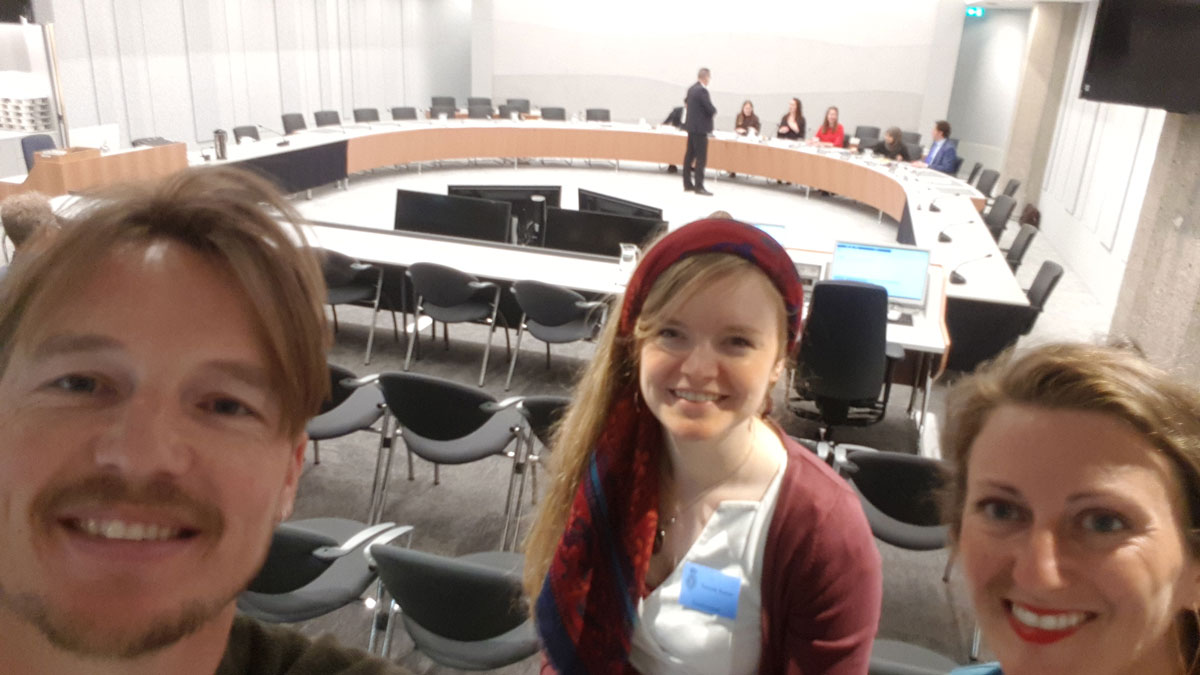
Emmy & Karl from Mission Reuse at the Dutch Parliament for the circular economy debates
Can you tell us a little bit about Mission Reuse? Where did the journey start and what does it aim to do?
Mission Reuse is a transition programme that powers the switch from disposables to reuse by combining policy work, knowledge sharing, narrative building and testing and scaling innovations. We test reusables concepts in practice including the needed infrastructure and return logistics. These tests take place in real settings, with real people where we can guarantee neutrality and , especially in settings where an independent party is favourable and where we can collect learnings to publicly share them. These practice examples support our advocacy work but also provide insights into the additional legislative framework that will is needed to allow these concepts to be replicated across Europe. We have focused mainly on reusable drinking cups, meal containers and e-commerce packaging.
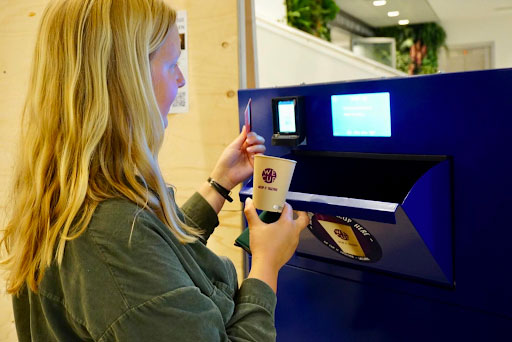
Mission Reuse researching and piloting a most scalable reuse system for the campus environment in Amsterdam
What do you think the future of reuse is in Europe?
An additional legislative push will be crucial to facilitate the transition, for example through the upcoming revision of the Packaging and Packaging Waste Directive. Some reuse systems like refillable beer bottles and cups at closed environments such as offices have proven successful implementation at scale in some countries. Obligations will speed up the transition throughout Europe and provide scale for reuse infrastructure, where establishing reuse streams can tap into. Reuse systems that are still being developed require action research to optimise customer engagement and return logistics. Strong binding prevention and reuse targets are needed to spark these developments.
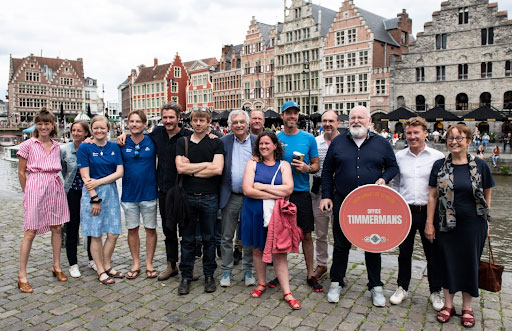
Mission Reuse in Ghent with reuse innovators and relevant policy makers at municipality, national and European level during our campaign about reusable coffee cups. The sign handed over to Frans Timmermans says: ‘’From single-use to reuse’’
How can Mission Reuse be supported further?
BFFP provides the ideal network to speed up knowledge exchange and feed those learnings into the transition towards prevention and reuse. To facilitate this exchange further we will also provide our reports and findings in English from now on. We have greatly benefitted from exchange and collaborations ourselves going from implementing learnings from abroad into our local policy recommendations to tapping into our joint network and expertise.
Support our work and the transition by pushing for the switch from disposable goods to reusable alternatives. Single-use glass has one of the largest CO2 footprints among packaging materials even though it is regarded as being very environmentally friendly. That's why we aim to not only tackle the plastic problem but also the single-use problem. Even with cardboard, we can switch towards prevention or reusable alternatives to maximise the packaging cycles before it needs to be recycled and produced again. As we want to optimise resource use on all levels, the switch towards more reuse alternatives goes beyond plastic packaging. Single-use cardboard and glass packaging have also significant environmental impact and viable reuse solutions are emerging. Support our work and the transition by pushing for the switch from disposable goods to reusable alternatives.
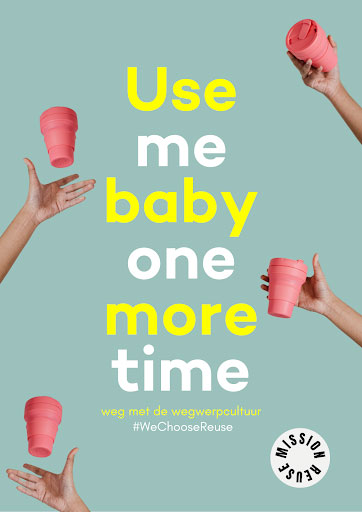
The study recorded microplastics made of polyethylene, often used in bags, wrappers and films, in surface waters in several sites on the lake. With the concern of the plastic pollution present in Uganda, End Plastic Pollution has taken the lead with their Plastic Free Campus activities across different schools and universities.
End Plastic Pollution is an environmental organization in Uganda raising awareness towards the science of plastics, its effects on people, the planet and climate system. It is an initiative of youth environmental activists, volunteers, and students to envision a future free of plastic. Through their work, they are gathering data, advocating and informing about the need for corporate polluters to be held accountable for the plastic pollution crisis.
The organization launched their Plastic Free Campus Program in 2021 in partnership with Break Free From Plastic and led by youth leaders that are working with youth, teachers and administrators in Primary and Secondary schools, Universities and other learning institutions.
The program now has a growing network of 12 schools and 4 universities including the prestigious Kampala International University. The organization believes that schools and universities play an important role in developing the mindset, awareness, and shaping habits of future citizens and leaders. They are helping students understand the science behind plastics, its harmful impacts on people and the environment, as well as the need to go plastic-free.
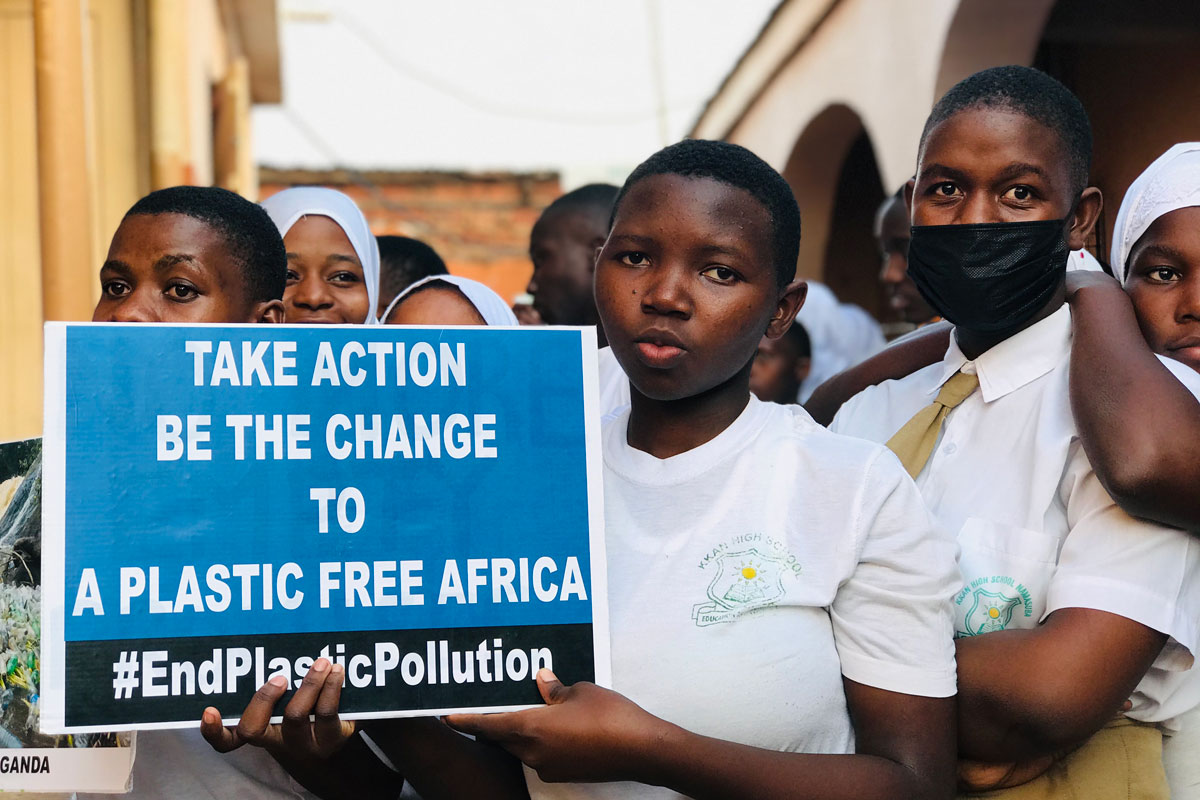
Photo credit: End Plastic Pollution Uganda.
The strategic approach of the program aims to create a platform for knowledge sharing through a series of activities: PFC Starter Seminar on plastic pollution, working with schools to sign the PFC pledge, and developing awareness with Brand Audits.
Through their Plastic Free Campus program, End Plastic Pollution have engaged over five thousand students, one hundred and twenty teachers and are mentoring six active students’ environmental clubs in schools with a membership of three hundred students.
Among the participating schools, three schools have restricted the use of plastic packaging bags in school canteens. Others, such as St Andrews Schools, Light College and Kkan High school have gone further to restrict visitors during official school visiting days, to ban bringing any plastic carrier bags locally known as “Kaveera,” and also ban school canteens selling these plastic goods on campus.
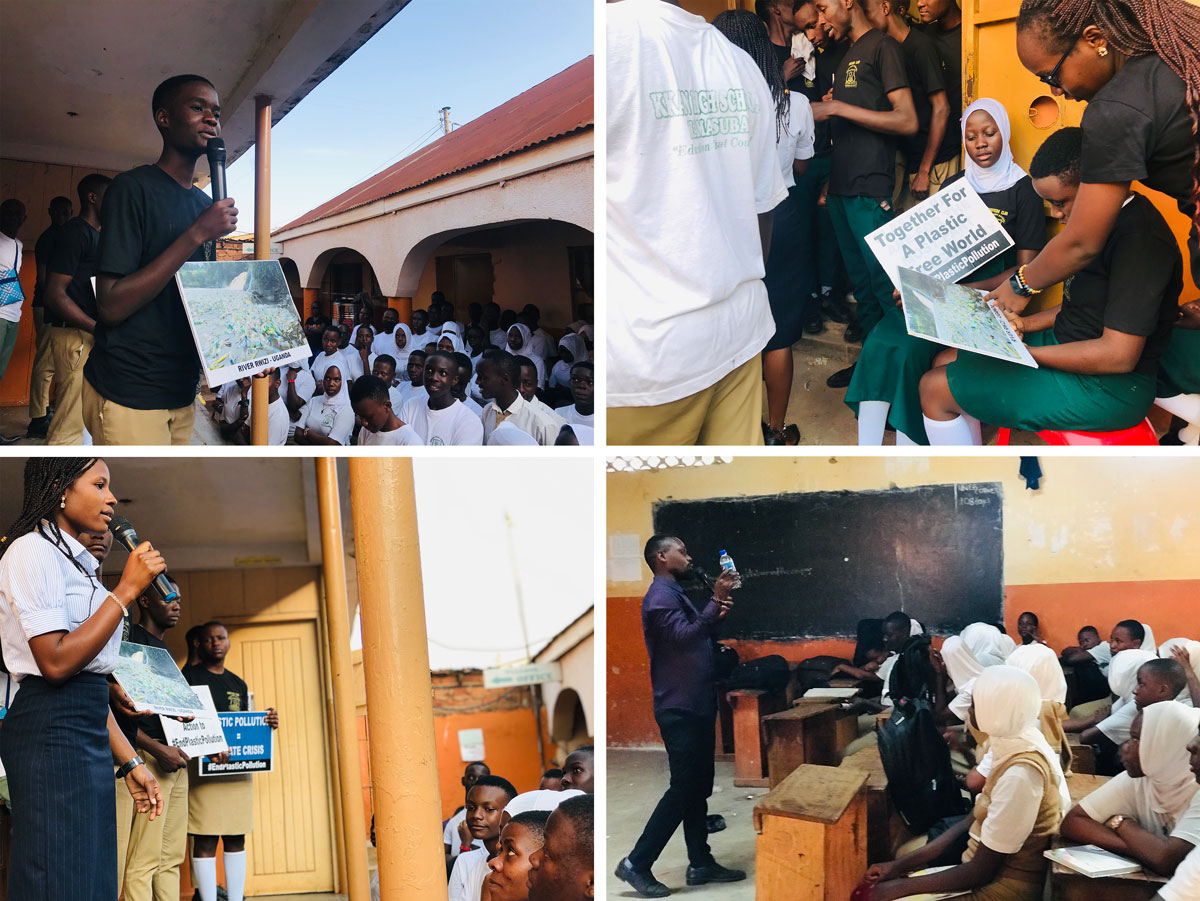
Photo credit: End Plastic Uganda.
Kkan High School, the latest member to join the Plastic Free Campus program, received a visit from End Plastic Pollution. Presentations were conducted to students focused on helping them to understand what plastics are as a material and its lifecycle. Examples of the impacts of plastic pollution in local communities were shown. The organization explained the plastic's impacts to the soil and water and the meaning for the many Ugandans that are dependent on Agriculture for food and earning income. Also, the students were engaged to think about ways to avoid single-use plastics and know what information they can share with their parents, friends and people in their local communities.
Students were very welcoming and eager to learn more about plastics, and shared about how plastic is affecting their communities. Zahara, a senior two student, shared how plastic is intoxicating the soils and affecting crop growth in her home district of Luweero. Andrew, a student in senior three class, is from the slums of Katwe in downtown Kampala City and shared that when plastics get into drainage channels, it leads to spread diseases like cholera and diarrhea.
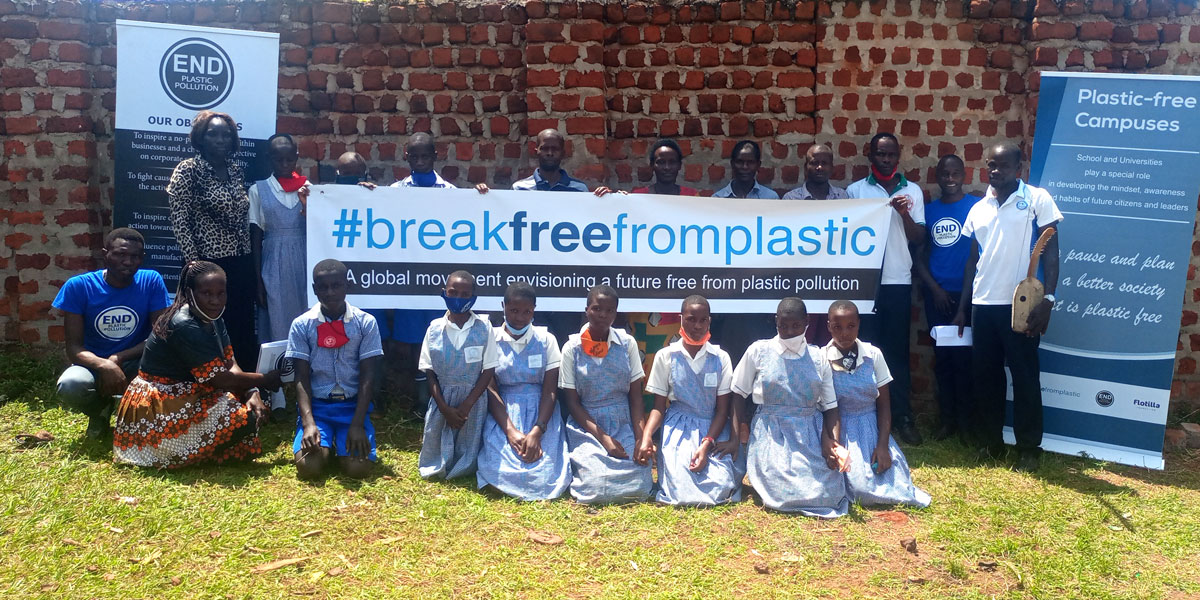
Photo credit: End Plastic Pollution Uganda.
To identify the top 10 polluters companies found in Uganda, End Plastic Pollution conducted in 2021 a brand audit in the shores of Lake Victoria. From their 2021 Brand Audit Report, twenty-four volunteers collected over four hundred plastic items, and the most found companies were The Coca Cola Company, PepsiCo, and Harris International. For this year’s report, the organization is planning to take further action and include sachets and unbranded items in their report, and also return the trash with a letter to the leading polluter.
To keep updated about the PFC campaigns in Uganda, follow End Plastic Pollution on Facebook, Twitter, Instagram.
Are you a teacher and want to learn more about how to integrate Plastic-free Education Curriculum into your own lesson plans? Break Free From Plastic is launching their first ever training program for educators.
Learn more about the map for science-integrated Plastics Education for Teachers.
Sources:
Robert Egessa, Angela Nankabirwa, Henry Ocaya, Willy Gandhi Pabire, Microplastic pollution in surface water of Lake Victoria, Science of The Total Environment, Volume 741, 2020.
Author's bio: Rafael Eudes is a Chemical Engineering student of the Federal University of Rio de Janeiro, member of the Circula UFRJ and ReUni organizations, and a BFFP youth ambassador.
Break Free From Plastic Youth and BFFP Plastic-free Campuses is supported by:
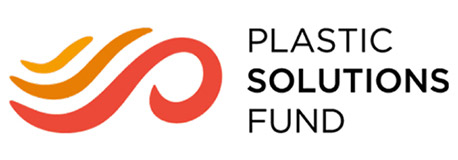
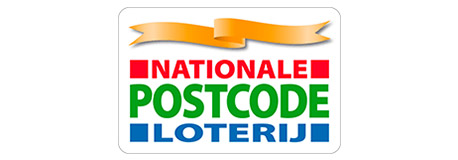
Contacts: Bethany Spendlove Keeley, European Communications Officer Break Free From Plastic: bethany@breakfreefromplastic.org / +49 176 59 58 7941 | Michael Luze, luzemichael@yahoo.fr
Brussels, Belgium – Citizens, businesses, cities and NGOs throughout Europe are calling on the EU to adopt legislation that supports reuse systems, notably for packaging, in order to reduce resource use, waste and pollution and achieve a circular economy. On the 12th October 2022, the Break Free From Plastic movement will hand over signatures collected by the #WeChooseReuse campaign, to European Commission Vice President, Frans Timmermans, and MEP Fréderique Riesas, as part of a campaign action outside the European Parliament in Brussels.
The handover event marks a major milestone of #WeChooseReuse. 100,875 individuals, 165 NGOs, 295 businesses and 34 municipalities signed the #WeChooseReuse commitment, demonstrating the need for EU policy to match the growing demand for reuse systems across Europe.
Almost all sectors are dependent on single-use packaging, with plastic being one of the main packaging materials. Production of packaging and packaging waste has steadily grown over the past 20 years and in 2018, Europe saw a record 174 kg of packaging waste per person. To counter this growing issue, #WeChooseReuse urges national and EU decision-makers to make reuse the new normal by harmonising packaging types to enable the scale-up of refill and reuse systems such as Deposit Return Schemes, and restrict the use of certain single-use packaging, especially where reusable products are possible.
The signature handover comes in time for the much anticipated revision of the Packaging and Packaging Waste Directive (PPWD), which will clarify the extent of the EU’s ambitions towards reuse by outlining requirements for packaging design and reduction in packaging and packaging waste.
Break Free From Plastic and its members have consistently called for the PPWD to support a just transition to reuse systems for packaging, including a cap on overall packaging decreasing over time, binding reuse targets, economic incentives and support for reuse and refill systems. Austria, Denmark, Luxembourg, the Netherlands and Sweden also called for the adoption of reuse targets at the EU level earlier this year.
“The devastating impacts of the dependency on single-use plastics and packaging is clear - yet so are the solutions. They fit in two keywords: reduction and reuse! ” said Justine Maillot, Policy coordinator of the Rethink Plastic alliance. “With the upcoming revision of its main legislation on packaging, the EU has an opportunity to end overpackaging and make reuse systems the new norm for packaging. Effective reuse systems across Europe would greatly reduce resource use, packaging waste and pollution while also contributing to reducing oil and gas consumption. Yet such systems can only blossom if the EU and EU governments adopt measures to enable reuse and create the confidence for reuse infrastructure to be built across Europe.”
The PPWD revision will additionally lay the ground for businesses and cities, both of which have been strong proponents of the #WeChooseReuse campaign, to strengthen the implementation of reusable systems and shift dependency away from single-use packaging
“Whilst EU and national regulations are needed to create a harmonised framework for reuse, it is at the local level where change is truly embedded within societies. The municipalities which have signed the #WeChooseReuse commitment shows that we have an alternative to the status quo. Together with our Zero Waste Cities, these signatories are showcasing practical examples of how reuse models are more cost-effective, healthier and better for the environment and communities.” said Jack McQuibban, Zero Waste Cities Programme Coordinator, Zero Waste Europe.
”To change the status quo of the packaging industry and strengthen the expansion of reuse systems, a coalition of forces is needed. The lack of an adequate legal framework that supports stable business models for a circular economy compromises the progress made by today's reuse pioneers. With the potential lack of ambition in the upcoming Packaging and Packaging Waste Directive, this completely jeopardises Europe's chance to bring fast, sustainable, social and economic change to our current system. This is why we support initiatives like #WeChooseReuse and the New ERA collective.” said Jeannette Morath, Founder, reCIRCLE AG.
MANILA (September 30, 2022) – Today, 110 educators from 32 countries joined the pilot of the Plastic-free Education Training Program launched by #breakfreefromplastic (BFFP). Since 2019, BFFP has been working with administrators, teachers, and students in shifting their schools away from single-use plastic. This year, BFFP is deepening its engagement with educators through this pilot training program to easily help educators integrate plastics education into their existing curricula. The event was hosted by Antoinette Taus, Goodwill Ambassador for the United Nations Environment Programme, and host of the Podcast of Plastic.
BFFP is set to roll out the Plastic-Free Education Training Program in countries in Asia, Africa, and Latin America. The program consists of a plastic-free education curriculum for ages 5 to 18, a training program that will support educators in integrating the same curriculum for their specific needs, and access to an educators’ network, which will serve as a platform for teachers to share resources and best practices with the aim of building an international community of educators committed to helping resolve the plastic pollution crisis. The training program itself is a hybrid of asynchronous and synchronous training sessions that will be housed in Google Classrooms and Zoom.
Educating students and teachers in schools on plastic pollution can help raise awareness and change people’s mindset on the use of plastic worldwide. This project aims to enhance the systemic thinking in young people’s learning spaces and to ensure that teachers are equipped in the education of young people on the plastic pollution lifecycle and its impacts, beyond being a waste management issue.
The youth and education spaces have been driving forces for action and change in the climate, human rights, and pro-democracy movements. There are 1.8 billion people aged between 10-24 years, with almost 90% living in developing countries. This is the largest generation of youth in history, who can connect to one another, build the resilience of their communities and drive social progress and political change. It’s also this current generation that’s most affected by both the plastics and climate crises and that will suffer the most from the effects of these in their adulthood—which means they have a large stake in the outcomes of what we do today. It is now crucial, more than ever, to empower educators in having the right tools to support their students towards a just and plastic-free future. This is also a pivotal point for educational institutions and agencies to embody this plastic-free narrative by providing this knowledge and awareness to young citizens.
ASec. Dexter A. Galban, Assistant Secretary for Youth Affairs and Special Concern of the Department of Education Philippines, said:
“It is essential that we build a culture of awareness and active participation in the fight against plastic pollution. This culture building starts by making our youth, and our young learners as a whole, make more enlightened decisions. We have to make them more involved in protecting our world. Bringing everyone into the fold is essential as the fight against the plastic pollution crisis requires a whole-of -nation approach, and at the same time, a global effort to make a change. With the help of our educators and advocates, we can, and we will make a difference. Rest assured that our office, the Office of the Assistant Secretary for Youth Affairs and Special Concerns of the Department of Education will be your ally.”
Mr. Diosdado San Antonio, Manager of the Educational Research & Innovation Office of the Southeast Asian Ministers of Education Organization Regional Centre for Educational Innovation and Technology (SEAMEO INNOTECH), representing Professor Emeritus Leonor Briones, Director of SEAMEO INNOTECH, said:
“Given how this generation’s future is on the line, education systems need to ramp up the provision of support to the young, in addressing these crises. Historically, young people have been key movers in driving social progress and political change. Today, we see how students across the world continue to move the needle on plastics and climate issues. This underscores the important role of educators in molding and supporting young people as they navigate the complexities of these crises and push for real, long-term change. This support involves access to accurate, timely, and nuanced information; proper guidance as they tread new paths and create solutions; and providing support when they go up against challenges and potentially powerful opponents.”
Mr. Mohammed Muhibur Rahman, Additional Secretary (School Wing) of the Ministry of Education of Bangladesh:
Plastic was once a great invention for our civilization but later on, it also became a curse for us. We need plastics education in every corner, and in every school. It is essential. To those who are working in our country (Bangladesh), we can work together and devise a plan for this movement.”
Ms. Nur Fitriana, Instructional Designer for the Directorate General of Early Childhood, and Secondary Education, Ministry of Education & Culture of Indonesia, said:
“I want to appreciate your presentation that showed not only “how” or “what” to learn about plastic education, but also “why?” Why do you teach about plastic? There are many strategies, and awareness is important not only in schools but also in communities and families. Answering “why” makes it easier to be sustained and continued. Many teachers shall understand that it is not only a concept of “why” we can’t use plastic, but it also encourages the critical thinking of students so that they can innovate and be creative.”
Educators who are interested in integrating our ready-to-use resources can head on over to BFFP’s Plastics Education Website to sign up and receive the materials. If you are interested in joining the training program, you may pre-register through bit.ly/bffpeductraining.
Educators for a Plastic-Free Future has been made possible through the contributions of more than 3 million participants of the Dutch Postcode Lottery, and support from the Plastic Solutions Fund.
About Break Free From Plastic – #breakfreefromplastic is a global movement envisioning a future free from plastic pollution. Since its launch in 2016, more than 2,000 organizations and 11,000 individual supporters from across the world have joined the movement to demand massive reductions in single-use plastics and push for lasting solutions to the plastic pollution crisis. BFFP member organizations and individuals share the shared values of environmental protection and social justice and work together through a holistic approach to bring about systemic change. This means tackling plastic pollution across the whole plastics value chain—from extraction to disposal—focusing on prevention rather than cure and providing effective solutions.www.breakfreefromplastic.org
###
Note to editors:
Full recording of the virtual launch event may be accessed here (Passcode: E1X.=YXV)
Press Contacts:
BRUSSELS – As the EU faces a looming gas shortage, EU countries are looking to consumers to shoulder the brunt of reductions and are pursuing deals to secure new fossil fuel supplies. At the same time, policymakers are leaving the plastics and petrochemicals sector — the single largest driver of the increase in global oil and gas demand — untouched. A new report from Break Free From Plastic and the Center for International Environmental Law (CIEL) explores the European market for plastics and petrochemicals, arguing that the EU, which sources nearly 40% of its gas and over 20% of its oil from Russia, can advance energy security by making cuts to these energy intensive industries.
“Plastics and petrochemicals are the largest industrial oil, gas, and electricity users in the EU, with nearly 40% of that energy going towards producing plastic packaging alone. Not including this sector in the “Save Gas for a Safer Winter” plan is a serious oversight. While families and small businesses are facing skyrocketing energy bills, the petrochemicals industry is wasting scarce resources to produce unnecessary single-use plastic, fueling the EU energy crisis.” said Delphine Lévi Alvarès, European Coordinator of the Break Free From Plastic movement.
The report’s main findings include:
• Plastic production was responsible for nearly 9% and 8% of the EU’s final fossil gas and oil consumption in 2020. This is about as much as the final gas consumption in the Netherlands and almost as much as the final oil consumption of Italy in 2020.
• Plastic production is the most energy- and feedstock-intensive of the petrochemicals industry’s processes. Plastic packaging alone accounts for 40% of the end market for plastic products in the EU, about as much as Hungary’s final gas and Sweden and Denmark’s combined oil consumption in 2020.
• Nearly 15% of the final gas and 14% of the final oil consumption in 2020 in the EU 27 were used to manufacture petrochemicals.
• In the EU in 2020, 38% of the gas and 22% of the oil came from Russia, making the energyintensive petrochemical industry significantly reliant on Russian fossil fuels.
• Together, Belgium, Germany, Spain, France, Italy, the Netherlands, and Poland are responsible for 75% of oil and 81% of final gas consumption, and 77% of all plastic packaging waste in the EU.
As the plastics industry plans to double its gas and oil-based production over the next 20 years, the report finds that this growth is incompatible with achieving the EU’s goals, including those laid out in the Green Deal, binding climate targets to keep global warming under 1.5°C, and efforts to tackle plastic pollution.
“Russia’s invasion of Ukraine lays bare the danger of our global dependence on fossil fuels. Expecting individual consumer action is an inadequate and disproportionate response to the scale and intensity of the crisis at hand,“ said Lili Fuhr, Deputy Director of CIEL’s Climate & Energy Program. “EU leaders must stop their neocolonialist hunt for new sources of fossil fuels and instead confront the problem head-on by immediately reducing the production of plastic, starting with unnecessary single-use plastic packaging to save gas.”
The report details concrete policy recommendations for the EU to reduce fossil fuel use for petrochemical and plastic production through ambitious prevention and reuse policies. These include regional action and efforts to step up ambition on upstream measures during upcoming negotiations on a legally-binding global plastic treaty.
“With a 50% reduction of plastic packaging and a 90% rate of recycling, we could save the equivalent of the Czech Republic’s annual oil and gas consumption. This is a huge opportunity for the EU to address the energy, climate and plastic pollution crises at once.'' said Lévi Alvarès. “It’s time for the EU to demonstrate real leadership. For a safer winter, plastic has to go.”
###
CONTACT: Michael Luzé, luzemichael@yahoo.fr
Break Free From Plastic is a global movement envisioning a future free from plastic pollution. Since its launch in September 2016, over 1,900 non-governmental organisations and individuals from across the world have joined the movement to demand massive reductions in single-use plastics and to push for lasting solutions to the plastic pollution crisis. These organisations share the common values of environmental protection and social justice, which guide their work at the community level and represent a global, unified vision. In Europe, Break Free From Plastic has more than 100 core member organisations covering all European subregions and with expertise all along the plastics value chain.
Center for International Environmental Law (CIEL) is a not-for-profit legal organisation that uses the power of law to protect the environment, promote human rights, and ensure a just and sustainable society. CIEL pursues its mission through legal research and advocacy, education and training, with a focus on connecting global challenges to the experiences of communities on the ground. In the process, we build and maintain lasting partnerships with communities and non-profit organisations around the world.